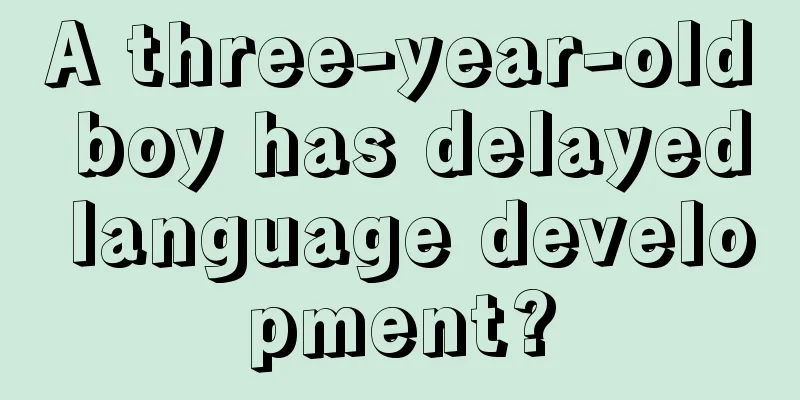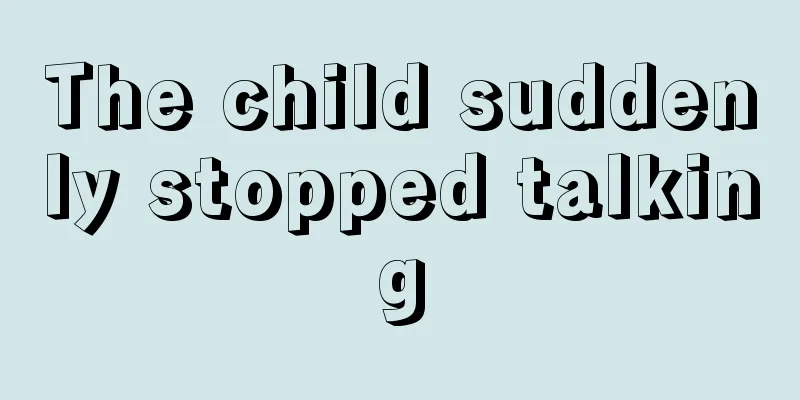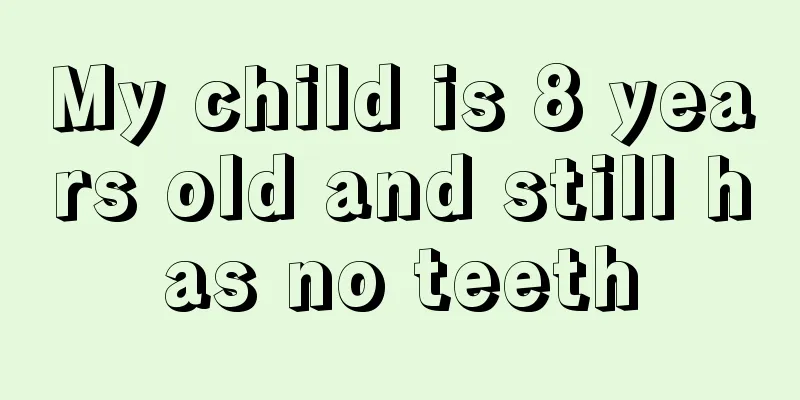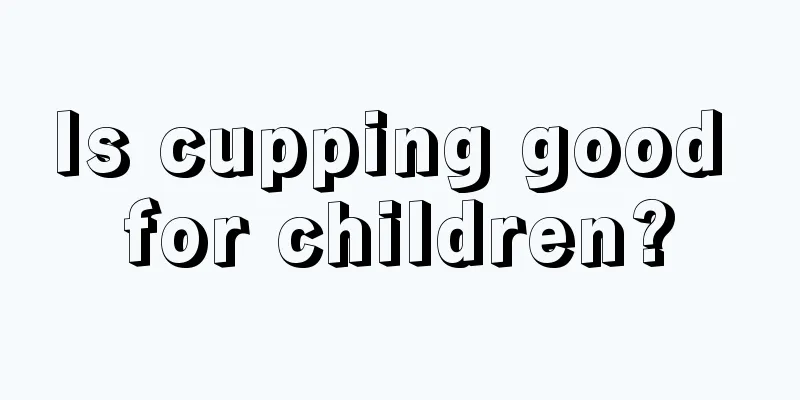A three-year-old boy has delayed language development?

|
Under normal circumstances, a three-year-old baby is already in kindergarten, and can speak simple words clearly. However, since each baby has different physical fitness and development speed, some babies develop faster and some develop more slowly, especially those with language disorders and developmental delays. If a three-year-old baby shows signs of developmental delay, it is best to take the baby to the hospital for examination and treatment in time. 1. What should I do if my 2-year-old baby can’t speak? Generally speaking, children can express themselves relatively well when they are two or three years old, can basically master the spoken language of their native language when they are four years old, and can clearly retell the main ideas of stories they have heard, tell stories based on pictures, or make up simple stories of their own after they are five years old. Under normal circumstances, there is a difference of 4-6 months between children who develop late and children who develop early. If the time limit exceeds this, parents should pay more attention. For example, most babies can speak relatively complete sentences when they are 2 years old, while some babies still cannot speak until they are 2 years old. However, the baby seems very smart. He understands everything you say and can do anything you ask him to do, but he just can't speak and his pronunciation is not accurate. When they have needs, they always use their hands to "gesture", and at most make some simple pronunciations. 2. What are the signs that your baby cannot speak or is speaking late? At 4 months old: cannot imitate the sounds made by father and mother. At 6 months old: Does not laugh or yell. 8-9 months old: Cannot use sounds to attract your attention; has not started babbling yet. At 10 months: Does not respond to others calling his name, and does not know how to let you know whether he is happy or annoyed. At 12 months old: He cannot use body language such as waving or shaking his head; he cannot utter one or two initial consonants (such as p, b, etc.); when he needs help, he does not know how to communicate with you. At 15 months: Does not understand words like "no" and "goodbye" and does not respond; can use less than 6 types of body language (such as waving hands, pointing at things, etc.); can say less than 1 to 3 words. At 18 months: Cannot say 6 to 10 words; cannot point to objects of interest, such as birds or airplanes flying in the sky. At 20 months old: can say less than 6 initial consonants. At 21 months: Will not respond to simple commands; will not pretend to play with dolls or on their own (such as combing their own hair, feeding dolls, etc.). At 24 months: cannot put two words together; does not know the functions of common household appliances (such as toothbrushes, telephones, chopsticks, etc.); cannot imitate other people's actions or learn to talk; cannot point out body parts when asked. At 30 months: No one, even family members, can understand him; he cannot speak simple sentences, ask questions, or make himself understood by strangers. By age 3: Does not speak in short phrases; does not understand brief instructions; has no interest in interacting with other children; has a hard time being separated from mom or dad. At 3 and a half years old: Often cannot speak complete sentences (for example, cannot say "go home", only "go back"). When he was 4 years old: he still stuttered frequently and others could hardly understand what he said. What exactly is the reason why these babies can't speak? 3. Physiological reasons cause babies to not speak 1. Check if the baby's tongue is adhered? 2. Take your baby to the hospital for a hearing check? 3. Other lesions, such as cerebral palsy, etc. If your baby cannot speak due to physiological reasons, you need to treat him as soon as possible and do not miss the golden time for treatment. If none of these reasons apply, look for other reasons. Talking late? It is best to wait until after the age of 4 for tongue tie surgery 4. The language environment causes the baby to not speak 1. You only talk to your child occasionally and rarely communicate with your baby verbally. 2. Apart from you, there are few people who talk to your baby. 3. My family members have mixed accents, including dialects, English, and Mandarin. Generally speaking, babies who are in the above three unfavorable language environments will start speaking later. If the language environment you provide for your baby is too monotonous or too complex, the child will not receive effective stimulation, resulting in delayed language development. You need to change immediately. You should talk to your child more often and temporarily unify the accent of the whole family so that your baby can understand and imitate easily. If the language environment you create for your baby is healthy, let's look for other reasons. 5. The communication method causes the baby to not speak 1. When you see your baby using simple gestures to express his needs, what is your reaction? A. Generally they can understand and help the baby to complete it. B. Even if you understand, you should teach your baby to speak out as much as possible. If your answer is A, then the reason why your baby “can’t speak” is most likely language inertia. You understand your baby's body movements so well and meet his or her needs immediately, making it unnecessary for him or her to speak. You need to gradually require your baby to speak out in order for you to understand what he means. 2. What kind of sentences do you usually use when talking to your baby? A. Normal sentences, just like talking to other adults. B. Use short sentences and speak slowly. If your answer is A, then the reason why your baby "doesn't like to talk" may be that the form of communication is too difficult and it is not easy for the baby to understand and imitate, or it may cause psychological pressure and make the baby think that he can only speak like an adult. You should slightly change the way you speak to your baby, speak in short sentences or use body language to express yourself with short sentences, close to your baby's ability to express, so that your baby can communicate with you in parallel. 6. Psychological reasons cause babies to not speak 1. What do you do when your baby starts to imitate you? A. Correct your baby's pronunciation in time and take the opportunity to consolidate it repeatedly. B. Regardless of how the baby pronounces, give timely encouragement. 2. When your baby uses gestures to express a need, you really want him to speak it out. What do you do? A. You must let the baby speak out before you help him, otherwise you will not satisfy him. B. Teach him repeatedly 2 or 3 times. If he really doesn’t want to speak, don’t force him and just meet his request. 3. You and your baby are looking at animal pictures with great interest, and you want to take the opportunity to teach your baby the names of the animals. His response was: A. As soon as you teach him, he becomes very annoyed and doesn't even look at the pictures. B. When you are teaching, your baby may occasionally imitate your pronunciation, but you should stop immediately when he shows signs of annoyance. If your situation is A most of the time, then the reason why your baby is not talkative is probably caused by you. You have too high expectations of your baby. You need to demonstrate how to communicate in a language form, rather than emphasizing the use of standard pronunciation and grammatical sentence patterns. For babies who obviously dislike "learning to talk", you should even express your understanding of any form of communication used by the baby and conduct parallel communication. Otherwise, this type of baby will reduce any communication with you. When he has any needs, he will no longer be willing to express them to you, but will do it himself, or simply give up his needs. This is very detrimental to the baby's mental health development. |
<<: What to do if your child has a high fever of 38 degrees
>>: What to do if a child has a low fever after a high fever
Recommend
Does the baby have less hair due to zinc deficiency?
My sister's baby is five years old, but he ha...
How to treat poor stomach in infants and young children?
It is common for infants and young children to ha...
Traditional Chinese medicine treats tonsillitis in children, these prescriptions should be kept well
If a child suffers from tonsillitis, some common ...
How often should you wash your newborn's hair?
We all know that after a baby is born, their hair...
What is the cause of ocular myasthenia gravis in children?
The most common symptoms of myasthenia in childre...
What are the treatments for mycoplasma infection in children?
Mycoplasma is a prokaryotic organism. Although it...
What causes vomiting and convulsions in children?
If a child vomits and has convulsions for a long ...
What to do if your child has incomplete brain development
Every parent hopes that their baby can be smart a...
What should I do if my child’s buttocks are itchy and red?
The child's anus is itchy and red. This situa...
Nursing methods for low birth weight infants
Nowadays, every family has only one child, and ma...
The baby does not sleep at night, it may be because of these
Many parents have reported that their babies are ...
Why are the whites of the newborn's eyes yellow?
There is a saying that goes, eyes are the windows...
What can babies eat to have white skin?
The condition of the baby's skin is determine...
Can babies with eczema be blow-dried?
Many babies experience skin diseases during their...
How much does a full-month baby eat?
The baby is one month old, and the mother has fin...









